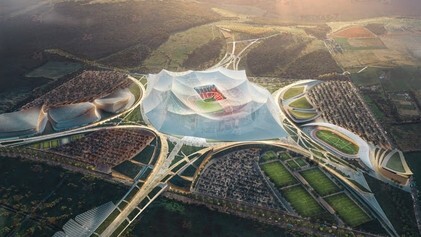Washington D.C. – As Morocco prepares to co-host, along with Spain and Portugal, the 2030 FIFA World Cup, the eyes of the Maghreb and the world will be on Morocco as it embarks on several ambitious infrastructure projects. Though early in the planning and construction process, Morocco is predicted to invest at least $5 billion on numerous infrastructure projects.
The Guardian recently published a feature on the grandiose project titled, “Football-mad Morocco dreams of a World Cup final in its own ark”.
While noting the North African country is passionate about football, the piece raised concerns about a myriad of issues, from worker protections to Morocco’s borders and geopolitical concerns.
While these could be seen as acceptable observations in the world of free exchange of ideas and viewpoints, the more relevant point, however, is the historical importance of this feat.
Morocco will move forward with an ambitious plan that celebrates the country’s deep roots in Africa while harnessing the progress they have made towards important measures of social and economic development. An example of this progress, sustainability, has been foundational in Morocco's development plans for decades, from Plan Maroc Vert (Green Plan) to the Noor solar power station.
The centerpiece of Morocco’s 2030 World Cup build is the planned Grand Stade Hassan II near Casablanca. With seating for 115,000 people, it would likely be the world’s largest football stadium.
Any and every nation chosen to host a premier event like the FIFA World Cup can be expected to take enormous pride in that selection. The honor allows a nation to harness collective national enthusiasm and resources to build something that they own—emotionally and physically–forever.
They can also be expected to write some sizable checks for the infrastructure that is needed.
Morocco's co-hosts are also in the process of infrastructural improvement to prepare for the grand event. Santiago Bernabéu soccer stadium in Madrid just underwent a $1.9 billion renovation. The Camp Nou stadium renovation, now in progress, will cost Barcelona over $1 billion.
Spain and Morocco are not unique in writing hefty checks for stadium renovation.
The London 2012 Summer Olympic Games cost $15 billion, over budget by some 75 percent. The games were a success, and they created momentum for a movement toward more sustainability in global high-attendance events.
The 2030 World Cup tri-partners can find inspiration from the recent Olympic games in Paris and the Qatar 2022 World Cup. From solar panels for power generation to stadiums that can be dismantled to recycled plastics for stadium seating, the 2030 World Cup will look very different from the one held in South Africa in 2010.
The infrastructure build will harness a post-COVID optimism in the region, just as tourism numbers are fast rebounding.
US News & World Report just placed Morocco as one of the best countries in the world (39th overall and second best in Africa) in terms of key quality of life measures. Transparency International’s corruption perception index ranks Morocco better than eighty other nations, besting Algeria, Brazil, Indonesia, Thailand and Turkiye–just to name a few.
Yes, transparency for worker safety is important–and not always evident during large infrastructure projects–be they in the EU or in Africa.
Along these lines, in 2003, Morocco adopted a comprehensive new labor force code. Implemented in 2004, the regulations cover employer-employee relations, regular and temporary employment contracts, working conditions, wages, and dispute resolution mechanisms.
In October 2003, the US Department of Labor began a multi-year project in partnership with the International Labor Organization to provide detailed training to Moroccan labor inspectors on effective general labor inspection procedures.
Looking ahead, Morocco is fortunate to have two partners, Spain and Portugal, who will provide complementary technical skills as well as additional venues for 2030. The collaboration gives real meaning to the late King Hassan’s often-repeated comment–Morocco is a tree whose roots are in Africa and which breathes through its leaves in Europe.

